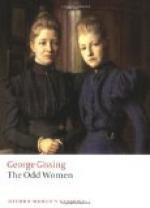CHAPTER XXXI
A NEW BEGINNING
Widdowson tried two or three lodgings; he settled at length in a small house at Hampstead; occupying two plain rooms. Here, at long intervals, his friend Newdick came to see him, but no one else. He had brought with him a selection of solid books from his library, and over these the greater part of each day was spent. Not that he studied with any zeal; reading, and of a kind that demanded close attention, was his only resource against melancholia; he knew not how else to occupy himself. Adam Smith’s classical work, perused with laborious thoroughness, gave him employment for a couple of months; subsequently he plodded through all the volumes of Hallam.
His landlady, and the neighbours who were at leisure to observe him when he went out for his two hours’ walk in the afternoon, took him for an old gentleman of sixty-five or so. He no longer held himself upright, and when out of doors seldom raised his eyes from the ground; grey streaks had begun to brindle his hair; his face grew yellower and more deeply furrowed. Of his personal appearance, even of cleanliness, he became neglectful, and occasionally it happened that he lay in bed all through the morning, reading, dozing, or in a state of mental vacuity.
It was long since he had seen his relative, the sprightly widow; but he had heard from her. On the point of leaving England for her summer holiday, Mrs. Luke sent him a few lines, urging him, in the language of the world, to live more sensibly, and let his wife ’have her head’ now and then; it would be better for both of them. Then followed the time of woe, and for many weeks he gave no thought to Mrs. Luke. But close upon the end of the year he received one day a certain society journal, addressed in a hand he knew to the house at Herne Hill. In it was discoverable, marked with a red pencil, the following paragraph.
’Among the English who this year elected to take their repose and recreation at Trouville there was no more brilliant figure than Mrs. Luke Widdowson. This lady is well know in the monde where one never s’ennuie; where smart people are gathered together, there is the charming widow sure to be seen. We are able to announce that, before leaving Trouville, Mrs. Widdowson had consented to a private engagement with Capt. William Horrocks—no other, indeed, than “Captain Bill,” the universal favourite, so beloved by hostesses as a sure dancing man. By the lamented death of his father, this best of good fellows has now become Sir William, and we understand that his marriage will be celebrated after the proper delays. Our congratulations!’
Subsequently arrived a newspaper with an account of the marriage. Mrs. Luke was now Lady Horrocks: she had the title desired of her heart.
Another two months went by, and there came a letter—re-addressed, like the other communications, at the post office—in which the baronet’s wife declared herself anxious to hear of her friends. She found they had left Herne Hill; if this letter reached him, would not Edmund come and see her at her house in Wimpole Street?




